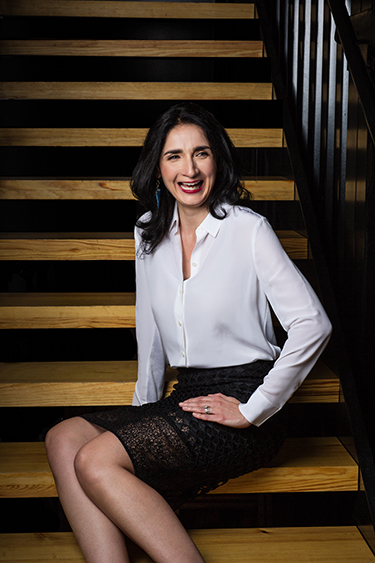High above downtown Austin’s bustling streets, on WP Engine CEO Heather Brunner’s office windowsill sits her very first cellphone. At first glance, the square, bulky device with protruding buttons and a long antenna could easily be mistaken for a walkie-talkie, a relic of the past that passively reminds her not only where the technology industry has been, but also its immense potential for growth and innovation.
 The 27-year veteran of the technology industry, who has held leadership roles at some of Austin’s most well-known companies—Oracle, Trilogy and Bazaarvoice, to name a few—is leading the charge, in more ways than one, when it comes to innovation and diversity in the tech field.
The 27-year veteran of the technology industry, who has held leadership roles at some of Austin’s most well-known companies—Oracle, Trilogy and Bazaarvoice, to name a few—is leading the charge, in more ways than one, when it comes to innovation and diversity in the tech field.
Brunner credits her father, who worked in the energy industry in Houston, for first introducing her to the business world.
“As a kid, I was always very fascinated by what he did. I would go to work with him a lot, particularly in the summers, so growing up, I was exposed to offices and work environments, and lots of discussion about travel [because]he would travel all over the world. So, I knew early on I wanted to do something related to business or world trade. Those things were very interesting to me,” Brunner says.
When it came time for Brunner to go to college, the fifth-generation Texan stayed close to home and chose to study at Trinity University in San Antonio. Brunner quickly settled on international economics as her major because it satisfied a wide range of her interests.
“International economics is a very interesting discipline. [I was] numbers-oriented and business-oriented, but also liked some of the more liberal-arts topics such as psychology and history, so economics was a good fit for me,” Brunner says.
 During her junior year, Brunner enrolled in a study-abroad program at the University of Cambridge in London, where she discovered her passion for the intersection of business and technology. At the City Club, an organization of students who were interested in economics and finance, Brunner attended a presentation by a partner from Andersen Consulting (which would later become professional services company Accenture) about a project the business was working on with Lloyd’s of London to automate the insurance-claims process. Brunner was fascinated, and after going up to talk to him after his presentation, she was invited to the Andersen Consulting office to meet clients and partners. That meeting led to Brunner landing a job offer from Accenture before graduation.
During her junior year, Brunner enrolled in a study-abroad program at the University of Cambridge in London, where she discovered her passion for the intersection of business and technology. At the City Club, an organization of students who were interested in economics and finance, Brunner attended a presentation by a partner from Andersen Consulting (which would later become professional services company Accenture) about a project the business was working on with Lloyd’s of London to automate the insurance-claims process. Brunner was fascinated, and after going up to talk to him after his presentation, she was invited to the Andersen Consulting office to meet clients and partners. That meeting led to Brunner landing a job offer from Accenture before graduation.
“I got that leg up just by being interested,” Brunner says. “I always tell people that if there’s something that sparks your interest, go and talk to someone. Even if they’re much more senior than you, they were you once. They appreciate the fact that you’re interested in what they do.”
In her seven years with Accenture, Brunner rose through the ranks from consultant to senior manager. Although she naturally gravitated toward big-picture-oriented roles that involved defining business requirements and project planning, Brunner notes that exceeding expectations in every role she held was key to breaking into leadership positions.
“I coach a lot of professionals across our global team, and one thing I always say is that from a leadership perspective, the first thing you can do is exceed expectations in your current role,” she says. “If you’re seen as somebody who is an exceptional performer and is exceeding expectations in your role, you’re more likely to have that next opportunity to move up.”
Demonstrating her expertise in certain areas of the business and being willing to take on challenges proved crucial to advancing Brunner’s career to the executive level.
“People who are the most successful executives have been a functional expert. For me, I was an expert in anything customer-facing, whether it was client services or sales,” she says. “I was in front of the customer, finding out their needs, defining their requirements, putting together proposals and executing to deliver on time and on budget. Excelling at that put me into positions like senior manager of a large project team, then practice director, then VP of client services and VP of operations. Having a specialty and being seen as an expert allowed me to go high and fast.
“Be somebody who is willing to take on challenges. Go where nobody wants to go. Be the one who’s willing to take the problem. Say, ‘I’ll do it,’ and then do it well. Doing that allows you to dive into other areas.”
In Brunner’s role as chief operations officer of the social-commerce platform Bazaarvoice, she navigated the company’s fast-paced growth through initial public offering and two acquisitions. Brunner was instrumental in developing Bazaarvoice’s early marketing strategy that put data-driven customer case studies at the forefront, proving the value of the company’s services in a cash-strapped marketplace. It was an especially difficult task to accomplish during the economic downturn of 2008 and 2009, but Brunner’s strategy produced huge results, driving a global adoption of more than 850 brands throughout 36 countries.
 “When things are down, customers want to make sure that every dollar they spend is going to get a real ROI. So we took this ROI, customer-success-focused, data-driven approach as our model. It drove conversion and allowed us to get some larger key brands to adopt us, and then more brands followed,” Brunner says.
“When things are down, customers want to make sure that every dollar they spend is going to get a real ROI. So we took this ROI, customer-success-focused, data-driven approach as our model. It drove conversion and allowed us to get some larger key brands to adopt us, and then more brands followed,” Brunner says.
Bazaarvoice was the first place where Brunner observed a high investment in company culture and its positive effects on the business.
“Bazaarvoice was a place where I saw the power of culture tied to attracting, retaining and growing incredible talent, which then created a really great business environment for our customers,” Brunner says.
In her current role as CEO and chairwoman of WP Engine, Brunner keeps purpose at the forefront of everything she does.
“If you look at the textbook definition, the role of the CEO is to maximize enterprise value for all shareholders and stakeholders. I feel that my job as CEO is to drive enterprise value, but do that through the power of purpose. I call it ‘EV to the P.’ Our purpose is to help our customers win online, and to do everything we can to help them be a step ahead of their goals,” Brunner says. “Whatever their goals are, we’re helping them succeed, whether through what we’re building in terms of technology or having a frontline conversation with a customer who needs help.”
WP Engine offers hosting services for websites built with open-source content management software WordPress, with plans in place to suit small businesses and large enterprises alike. Most people think of WordPress as a blogging tool, but many business’ professional websites are built with WordPress. According to W3Techs, WordPress is the CMS used by 28 percent of all websites.
The WP Engine platform enables users to optimize their website’s performance, get insights on how well their website is performing and keep their website secure.
“Large companies have million-dollar budgets for their websites, so they’re able to have a great focus on uptime, speed, security, scalability and expertise because they’re paying a premium for that,” Brunner explains. “What we do is allow businesses of all sizes to take advantage of a technology that is open-source and free by building a technology platform and a service-delivery platform that makes it easy for customers to build really compelling, high-performing websites in a cost-effective way [and]get insights and intelligence from their websites. At the end of the day, in essence, we’re trying to democratize web tech.”
One of the first things Brunner did after joining WP Engine in 2013 was define the company’s core values. The five core values—do the right thing, customer-inspired, where the best get better, built to last and aspiring to lead, committed to giving back—function as an underlying framework that guides everything the company does. Every year, the company holds a signing ceremony during which each employee signs a large printout of the core values, which is then displayed in the office lobby.
 “Companies are a collection of people. If you think about a startup, when you have 10 people in a room, all together, it’s really easy to communicate with each other, and usually at that stage, you are very likeminded,” Brunner explains. “But as you continue to grow, if you don’t codify your core values, then it’s difficult for that culture to scale. Codifying your core values allows you to declare, ‘This is who we are and this is what’s important to us.’ ”
“Companies are a collection of people. If you think about a startup, when you have 10 people in a room, all together, it’s really easy to communicate with each other, and usually at that stage, you are very likeminded,” Brunner explains. “But as you continue to grow, if you don’t codify your core values, then it’s difficult for that culture to scale. Codifying your core values allows you to declare, ‘This is who we are and this is what’s important to us.’ ”
Even Brunner isn’t immune to being driven by WP Engine’s core values. Inspired by the aspiring to lead and committed to giving back core values, Brunner spearheaded the creation of Torque, an online magazine for WordPress developers that spans a variety of beginner-level and advanced topics, from selecting a theme to building a plugin from scratch. Although Torque is sponsored by WP Engine, the magazine’s content is curated by an independent editorial staff.
“Brands need to act like publishers and think of themselves as thought leaders in content,” Brunner says. “We want to be seen as a key contributor to and supporter of the WordPress community. At the time, we couldn’t afford a full-time engineer to work on the WordPress core project, so we saw Torque as a way for us to give our expertise.”
During her four-year tenure as CEO, Brunner has led multiple rounds of fundraising for WP Engine, bringing the total investment in WP Engine to more than $40 million.
“It’s a very large market and we have big aspirations, but we’ve been able to very effectively control our expenses and drive more scale to fund our investments,” Brunner says. “A lot of times, tech companies have a high-burn-rate mentality, and we’ve done a great job of creating hypergrowth and really strong customer satisfaction at a low burn and very capital-efficient way.”
Rapid growth can have detrimental effects on company culture, but despite global expansion to locations in San Antonio; San Francisco; Limerick, Ireland; and London, WP Engine remains a strong, respectable place to work. The company has been named on the Austin Business Journal’s Best Places to Work list for the past three years and was named a Top Workplace by the Austin American-Statesman in 2015. To make WP Engine a great place to build a career, Brunner focuses on creating a company culture in which employees can be their true, authentic selves while at work, a culture that fosters an energetic and creative environment.
“When you’re at work, you naturally kind of have to put up a little bit of a guard. I’ve been in environments where there was fear and judgment, or it was very hierarchical,” Brunner says. “Our aspiration is that when you join the company, we, as quickly as possible, get you to that place where you feel as comfortable and at ease here as you do at home. We think that brings out your best authentic self, and when you’re there, you are your most creative. You’re putting your energy towards what’s at hand versus thinking about whether you’re going to get your hand slapped. … If information flows freely and equally, it lets everyone participate in the creativity of the business.”
It’s simple, really: A high level of investment in employees leads to better employee performance and better business results.
 “Happy employees who feel like they are informed and empowered put all their energy and excitement into our customers. Then our customers have a great experience. They feel like we’ve got their back [and that]we’re innovating and taking them forward. That equals great shareholder and great business performance,” Brunner says. “There’s a debate in a lot of companies about whether to put the customer or employees first. When you put the employee first, they put the customer first. And then great things happen.”
“Happy employees who feel like they are informed and empowered put all their energy and excitement into our customers. Then our customers have a great experience. They feel like we’ve got their back [and that]we’re innovating and taking them forward. That equals great shareholder and great business performance,” Brunner says. “There’s a debate in a lot of companies about whether to put the customer or employees first. When you put the employee first, they put the customer first. And then great things happen.”
Described by online magazine Gadgette as “the CEO who’s nailing tech diversity,” Brunner has intentionally shaped WP Engine into a highly diverse workforce. Out of more than 400 employees, 26 percent are women, 30 percent are non-white and 5 percent are LGBTQ individuals.
“Most of my time in my tech history, I have been surrounded by people who went to college and were star performers in college, and for the most part did not have a lot of poverty around in their day-to-day life,” Brunner notes. “I was in very competitive environments [that were]mostly male and mostly white.”
One way WP Engine promotes diversity is by hiring people who have experience with the WordPress platform but don’t necessarily have a college degree. Today, 35 percent of the WP Engine team does not have a college degree; many employees are hired after completing workforce-development programs or boot camps.
“Jason [Cohen, WP Engine founder,] had built a team that did not look like your typical tech company. So, here I come walking in, and it was very eye-opening,” Brunner says. “Initially, I had these biases: Are we going to have the same level of performance? Are we going to have to hire more people with more experience? I very quickly had this awakening. The team was committed. They were loyal. They all had the same intellect and the same passions as someone who went to college. They just didn’t have the same opportunity.
“We are an on-ramp for people who have the intellect, the heart and the passion to be in tech but just haven’t had the opportunity. We have an opportunity to be a voice for diversity [and]to show that technology can be a place for people of all backgrounds to thrive.”
Notably, women comprise 30 percent of non-executive leadership roles and 65 percent of senior executive roles at WP Engine.
“I met more women leaders in my first six months at WP Engine than I had met in the prior decade,” Brunner notes. “I spent probably the first 20 years of my career basically trying not to be a woman and not put attention on the fact that I’m a woman or that I have kids at home. My view was that if I did that, it would take away from my strength and my being viewed as an executive and a leader. But actually, a big part of my strength is the fact that I am a woman, I am a mother, that I can be feminine and tap into the energy of who I am as a woman. And that, actually, is why I’ve been able to do the things I’ve been able to do. I recognized that if I’d been feeling this way, I needed to do a better job of being an advocate for women.”
 In 2016, WP Engine committed to the White House’s Equal Pay Pledge. To standardize pay and eliminate pay inequality, the company adopted a simple and refreshing policy: Each employee in the same role with the same level of experience starts out with the same salary. Salary negotiations aren’t part of the hiring process; all employees enter the company on a level playing field and earn raises and promotions based on their performance.
In 2016, WP Engine committed to the White House’s Equal Pay Pledge. To standardize pay and eliminate pay inequality, the company adopted a simple and refreshing policy: Each employee in the same role with the same level of experience starts out with the same salary. Salary negotiations aren’t part of the hiring process; all employees enter the company on a level playing field and earn raises and promotions based on their performance.
“For women, that’s a great commitment because, for example, if you were to be promoted to a new role in the company, you know that the company will pay you as equally and treat you as fairly as your male peers,” Brunner explains. “By taking a no-haggling philosophy, it allows everybody to feel more comfortable and assured that they’re treated fairly.”
Brunner is fond of saying the phrase “diversity attracts diversity,” meaning that as a company naturally attracts and retains diverse talent, that diversity is sustained from the inside by employee referrals. It’s a strategy that clearly works. Sixty percent of WP Engine’s employees have been referred by current team members. And that diversity is highly advantageous. With more than 60,000 customers in 136 countries, WP Engine’s customer base is extremely global.
“When you can reflect your customers, you’re much more relatable as a company. In general, I think people prefer to associate themselves with brands who care about people, treat their employees well and give them opportunities to rise,” Brunner says. “Having a very diverse team be represented is something I think our customers appreciate and value.”
One would think Brunner’s plate is already full, but in addition to her full-time job, she is also a partner at Capital Factory. In the past, Brunner has also served as a startup advisor and mentor at Capital Factory, lending her wealth of experience to entrepreneurs at any level.
“My constant advice I give to anyone I’m talking to is to know your hero customer. Your product can probably serve a multitude of different personas, but pick one and go talk to them,” Brunner says. “Find out who they are, what their life is like, what problems they have and how your idea will help them. Sometimes entrepreneurs will have an idea but they’ve spoken to no one. It’s kind of criminal to see that happen. The heavy lifting of identifying your hero customer is one of the most important things you will do as an entrepreneur.”
Brunner is also one of the founders of Women at Austin, a community that provides quarterly forums, workshops and mentoring events to a growing network of women entrepreneurs.
“Women at Austin has been able to very quickly put a spotlight on the fact that there’s an incredible community of phenomenal women here in Austin, and we need to continue to support each other and help each other,” she says. “I want to see us do more with it. We need to think about how we are going to take it to the next level. Right now, it’s all very grassroots and relatively informal. Looking ahead, we’re taking Women at Austin and making it future-proof.”
It’s a challenge to sum up an individual and her achievements in fewer than 4,000 words, and even more so in fewer than 160 characters, but Brunner’s Twitter bio, in which she describes herself simply as “passionate about working towards equality and opportunity for all people,” is incredibly succinct and adequately fitting.
“I’ve been having an awakening over these last four years to be a bigger advocate for women and for people who have typically not had the same advantages as others,” Brunner says. “I hope that by somebody getting to know my story better, they would feel inspired to do the same thing.”
MEET THE WOMEN EXECUTIVES OF WP ENGINE
Heather Brunner
Chairwoman and CEO, WP Engine
As chairwoman and CEO, Heather Brunner has steered WP Engine to hypergrowth and global expansion, with offices in Austin, San Antonio, London, San Francisco, and Limerick, Ireland serving 60,000 customers in 136 countries. A 27-year technology veteran, Brunner helped create billions in value, drove customer success and led business strategy for both privately funded new ventures and Fortune 500 companies. Prior to WP Engine, Brunner served as chief operations officer of Bazaarvoice during a period of rapid global growth through initial public offering and two acquisition integrations, growing the number of global brands to more than 850 in 36 countries, including Best Buy, Blue Shield of California, Costco and Macy’s, among others. In 2015, Brunner was awarded a silver Stevie Award for Female Executive of the Year and Best CEO from the Austin Business Journal. Most recently, Brunner was a finalist for the 2016 EY Entrepreneur of the Year Award for Central Texas.
Mary Ellen Dugan
Chief Marketing Officer, WP Engine
Mary Ellen Dugan leads all WP Engine global marketing activities, ranging from product marketing, partner enablement and demand generation, brand building, advertising and integrated marketing. An accomplished senior marketing executive with 20 years’ experience, Dugan has held a number of senior-executive roles at multinational companies, including vice president of global marketing at indeed.com, where she launched the company’s first-ever brand campaign; executive director of global brand and consumer advertising at Dell; and various executive roles at agencies such as Landor Associates and Daymon Worldwide.
April Downing
Chief Financial Officer, WP Engine
April Downing is a seasoned financial and operational executive with more than 20 years of experience. Having raised more than $220 million in capital and completed more than 20 acquisitions, Downing appreciates the complexity of managing technology and services companies at various stages. In addition to leading the finance side of the house for both publicly and privately held companies, Downing has a passion for people and has led talent and culture teams at various companies in the last decade. Downing currently serves on the board of directors of Helping Hand Home for Children and is a member of the National Charity League of Austin, through which she shares her love of volunteerism with her daughter.
Tina Dobie
Senior Vice President of Customer Experience, WP Engine
As a results-driven, client-services-technology executive, Tina Dobie has spent more than 20 years building and leading global teams to drive customer value realization while simultaneously optimizing internal operations for high growth and scalability. Her experience spans industries such as software as a service, enterprise software, strategic-management consulting and consumer packaged goods. Dobie helped drive WP Engine’s entire customer-experience team to two gold Stevie Awards for Best Customer Service Department in the past year, and has also earned the company a world-class Net Promoter Score. She holds a bachelor’s degree in business administration and a master’s degree from the McCombs School of Business at the University of Texas, and was a fellow for the Consortium for Graduate Study in Management. She lives with her husband and two daughters, who are all actively involved in the community through their work with the National Charity League.


